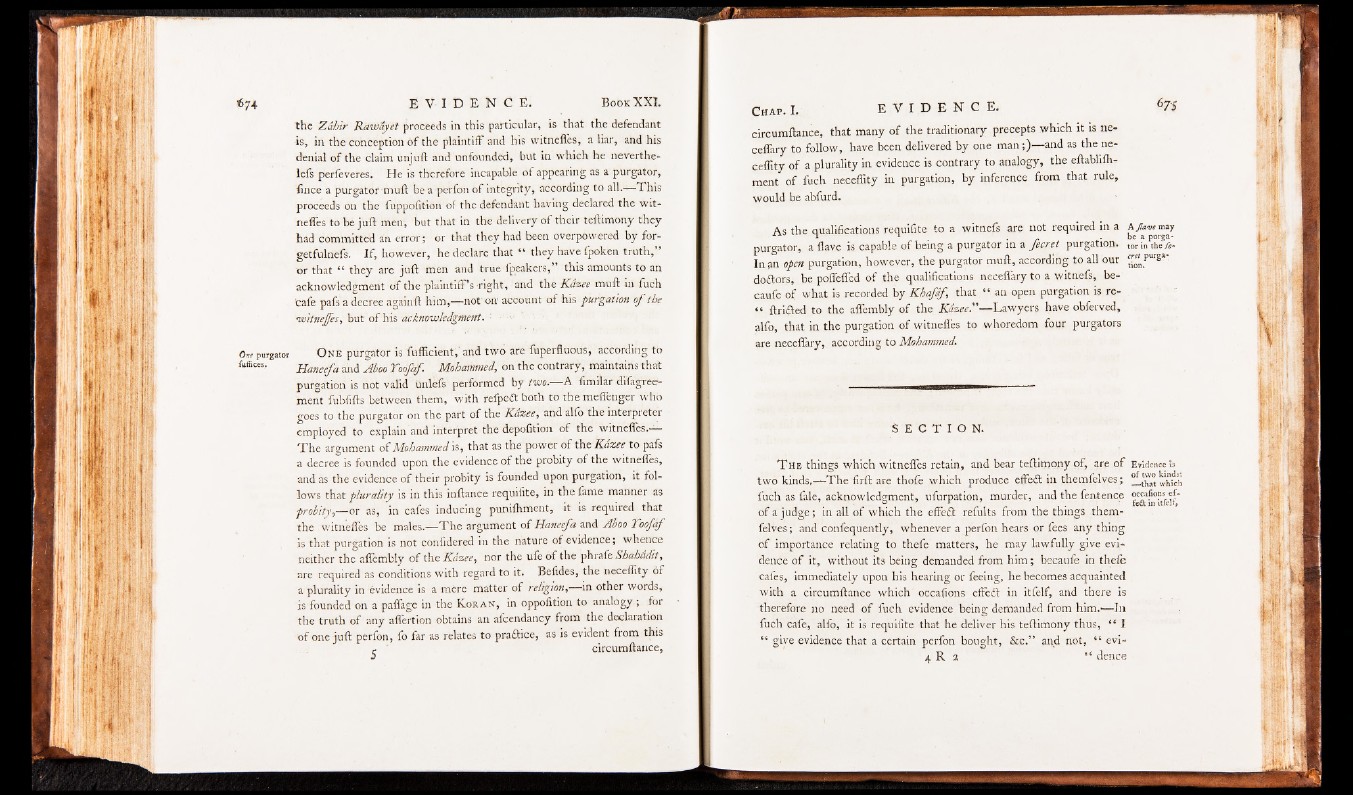
the Zâhir Rawdyet proceeds in this particular, is that the defendant
is, in the conception of the plaintiff and his witnefles, a liar, and his
denial of the claim unjuft and unfounded, but in which he neverthe-
lefs perfeveres. He is therefore incapable of appearing as a purgator,
ftnce a purgator mu ft be a perfon of integrity, according to all.— This
proceeds on the fuppofition oF the defendant having declared the witnefles
to be juft men, but that in the delivery of their teftimony they
had committed an error ; or that they had been overpowered by for-
getfulnefs. If, however, he declare that “ they have fpoken truth,”
or that “ they are juft men and true fpeakers,” this amounts to an
acknowledgment of the plaintiff’s right, and the Kdzee muft in fuch
cafe pafs a decree againft him,— not; on account of his purgation o f the
witnejfes, but of his acknowledgment, '■ '
One purgator O n e purgator is fufflcient, and two are fuperfluous, according to
fuffices. Haneefa and Aboo Toofàf Mohammed, on the contrary, maintains that
purgation is not valid iinlefs performed by two, A flmilar difagree^
ment fubfifts between them, with refpeft both to the meflenger who
goes to the purgator on the part of the Kazee, and alfo the interpietei
employed to explain and interpret the depofition of the witnefles.
T h e argument of Mohammed is, that as the power of the Kazee to pafs
a decree is founded upon the evidence of the probity of the witnefles,
and as the evidence of their probity is founded upon purgation, it follows
that plurality is in this inftance requifite, in the fame manner as
probity,— or as, in cafes inducing punifhment, it is required that
the witnefles be males.— The argument of Haneefa and Aboo Yoofâf
is that purgation is not confidered in the nature of evidence; whence
neither the aflèmbly of the Kazee, nor the ufe of the phi a feShahddit,
are required as conditions with regard to it. Befides, the neceflity of
a plurality in évidence is a mere matter of religion, in other words,
is founded on a paflage in the K o r a n , in oppofition to analogy ; foi
the truth of any afl'ertion obtains an afcendancy from the declaration
of one juft perfon, fo far as relates to practice, as is evident from this
c ‘ circumftance,
circumftance, that many of the traditionary precepts which it is ne-
eeffary to follow, have been delivered by one man;)— and as the ne-
ceffity of a plurality in evidence is contrary to analogy, the eftablilh-
ment of fuch neceflity in purgation, by inference from that rule,
would be abfurd.
As the qualifications requifite to a witnefs are not required in a kjiam m*y
purgator, a Have is capable of being a purgator in a fecret purgation. tor in the fe -
In an open purgation, however, the purgator muft, according to all our %l purs-
doctors, be poflefled of the qualifications neceflary to a witnefs, be-
caufe of what is recorded by Khafiif, that “ an open purgation is re-
“ ftrifted to the aflembly of the Kdzee.” — Lawyers have obferved,
alfo, that in the purgation of witnefles to whoredom four purgators
are neceflary, according to Mohammed.
S E C T I O N .
T he things which witnefles retain, and bear teftinaony of, are of Evidence is
two kinds.— The firft are thofe which produce effedt in themfelves; which
fuch as fale, acknowledgment, ufurpation, murder, and the fentence occalions efr
H 1 . . ' k & m melt,
of a judge; in all of which the effect refults from the things themfelves;
and confequently, whenever a perfon hears or fees any thing
of importance relating to thefe matters, he may lawfully give evidence
of it, without its being demanded from him; becaufe in theft:
cafes, immediately upon his hearing or feeing, he becomes acquainted
with a circumftance which occafipns efiedt in itfelf, and there is
therefore no need of fuch evidence being demanded from him.— 111
fuch cafe, alfo, it is requifite that he deliver his teftimony thus, “ I
“ give evidence that a certain perfon bought, &c.” and not, “ evi-
4 R a “ dence